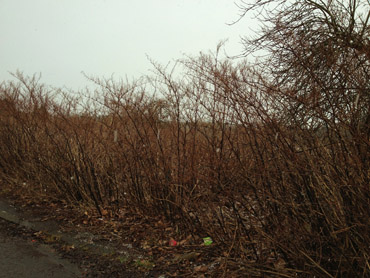Down District Councillor Carmel O’Boyle has described the issue of the invasive species Japanese Knotweed as “an overwhelming problem.”
As it has become literally well rooted in Down District, widespread concern is mounting about its constant advance. Councillor O’Boyle said: “For over two years, local elected representatives from Newcastle have been highlighting the dangers of the rapid spread of Japanese Knotweed in the area. The appearance of this weed in Newcastle has become increasingly worrying and Newcastle councillors have been at pains to raise awareness of the damage this weed can do if left untreated. This serious issue must be addressed at Council and Assembly level.”
[caption id="attachment_44252" align="alignleft" width="390"] Councillor Carmel O’Boyle, Sean Rogers MLA and Newcastle SDLP Constituency Manager Councillor Laura Devlin pictured last year expressing their concern about the Japanese Knotweed threat in Newcastle.[/caption]
Councillor Carmel O’Boyle, Sean Rogers MLA and Newcastle SDLP Constituency Manager Councillor Laura Devlin pictured last year expressing their concern about the Japanese Knotweed threat in Newcastle.[/caption]
Japanese Knotweed can grow four inches in a day from April to October and a tiny root can establish itself as a plant in just ten days. Newcastle Councillor Carmel O’Boyle who first raised concerns about the spread of Japanese Knotweed in Council last year said: “So serious has this matter become right across the British Isles that last week the Home Office published a briefing document on the reform of anti-social behaviour powers which normally control drunkenness, drug-taking and objectionable conduct.
“The revised legislation will include and target plants which can cause illness, threaten biodiversity, damage property and clog waterways that in turn increases flood risks. According to a Home Office briefing paper of 24 October, “Japanese Knotweed, for example, can grow through tarmac and can cause structural damage to property, whilst giant hogweed can cause harm to human health. Under the new scheme The Anti-Social Behaviour Crime and Policing Act 2014 can be used to order an individual to prevent the growth and spread of plants that are capable of causing serious problems to communities. Local councils or the police would be able to issue notices which can place restrictions on someone’s behaviour, if aged over 16 – or force them to take steps to rectify the behaviour that is having a detrimental effect on the quality of life in the community.’
“The document further states: ” ‘Breach of any requirement of a community protection notice, without reasonable excuse, would be a criminal offence.’ People who fail to act to stop the spread of an invasive plant species such as Japanese Knotweed, will be deemed to be acting unreasonably and could face sanctions, including a fine currently set at £2,500 for an individual, or a fine of £20,000 if the land is registered in the name of a company.
[caption id="attachment_52664" align="alignright" width="370"] Invasive species in County Down – Japanese Knotweed pictured in winter.[/caption]
Invasive species in County Down – Japanese Knotweed pictured in winter.[/caption]
“Already in places in England, some properties have lost half their value because Japanese Knotweed has invaded their gardens. The problem is compounded in some cases when the strips of land that were the primary source of the Japanese Knotweed were found to be unregistered. Luckily in Newcastle ownership of all the lands that have so far been found to be contaminated with Japanese Knotweed are recorded with the Land Registry, so the owners have been identified.
“It is important to know who the owners of the contaminated lands are for possible enforcement and compensation purposes, should the contamination spread to adjacent properties. The Northern Ireland Environment Agency has been proactive in helping communities tackle this very worrying problem.
“We have asked repeatedly for local people to help us identify areas where Japanese Knotweed is growing in order that it can be contained in a proper manner by experts, and landowners should seek advice from the NIEA and Down District Council if they find the weed has taken hold on their land. Cutting this weed will cause it to spread, so usually a three year cycle of treatment with herbicides is the recommended way to tackle the problem, but this needs to be done by professionals. All homeowners need to be vigilant and if they feel their properties are close to contaminated land, they should report their concerns to the NIEA, to local councillors and to their MLA’s.”
Councillor O’ Boyle added: “I intend to bring a Notice of Motion to our Council in November about this very serious subject. Already in England, the spread of Japanese Knotweed has reached epidemic proportions, and here in Northern Ireland, we are not far behind.
“In Newcastle the problem is particularly serious, but this weed is in other parts of the district as well, including in Downpatrick. We cannot afford in Newcastle to have areas like our golf courses and waterways taken over by this most invasive of plant species. Down District Council treats the problem on our lands, but owners of private lands are not doing this as diligently as they should and in some cases seem to be burying their heads in the sand.
“Our Council is planning to carry out a mapping exercise in order to identify all the hot spots in Newcastle, but we need the public to be vigilant and for land owners to cooperate with us. I really appreciate your help in highlighting this awful problem.”
Japanese Knotweed is a very difficult plant to eradicate and its rhizomes can remain dormont in the ground for up to 25 years. The removal of this plant requires a specialist contractor.
]]>























